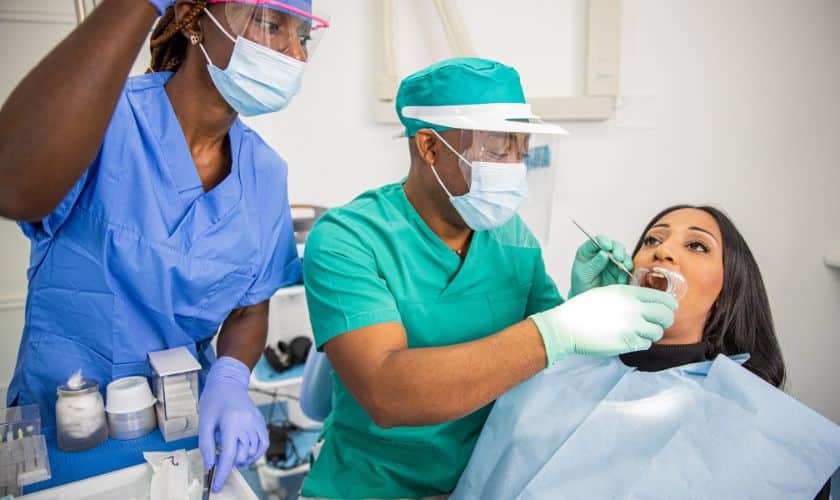Emergencies can happen when we least expect them, and dental emergencies are no exception. From sudden toothaches to knocked-out teeth, knowing how to prevent and address common dental emergencies can make all the difference in preserving your oral health and alleviating discomfort. In this blog, we’ll explore proactive measures to prevent dental emergencies and essential steps to take if you find yourself facing one.
Preventing Dental Emergencies
Prevention is always better than cure, and when it comes to dental emergencies, taking proactive steps to protect your teeth and gums can help minimize the risk of unexpected problems. Here are some strategies for preventing dental emergencies:
- Maintain Regular Dental Check-ups: Schedule regular dental check-ups and cleanings with your dentist to monitor the health of your teeth and catch any potential issues early on.
- Practice Good Oral Hygiene: Brush your teeth twice a day with fluoride toothpaste, floss daily, and rinse with an antimicrobial mouthwash to remove plaque and prevent cavities and gum disease.
- Wear Protective Gear: If you participate in contact sports or activities with a risk of dental injury, wear a mouthguard to protect your teeth and gums from impact.
- Avoid Chewing Hard Objects: Refrain from chewing on hard objects like ice, popcorn kernels, or pen caps, as this can lead to tooth fractures or chips.
- Use Caution with Sticky Foods: Be cautious when consuming sticky or chewy foods, as they can adhere to the surfaces of your teeth and increase the risk of dental decay or damage.
- Limit Sugary and Acidic Foods: Minimize your intake of sugary and acidic foods and beverages, as they can weaken tooth enamel and increase susceptibility to cavities.
Treating Dental Emergencies
Despite our best efforts to prevent them, dental emergencies can still occur. Knowing how to respond promptly and effectively can help minimize pain and damage. Here’s what to do in common dental emergency situations:
- Toothache: Rinse your mouth with warm water and gently floss to remove any trapped food or debris. Take over-the-counter pain medication as directed and apply a cold compress to the outside of your cheek to alleviate swelling.
- Knocked-Out Tooth: If a permanent tooth is knocked out, handle it carefully by the crown (top) and avoid touching the root. Rinse the tooth with water if dirty, but do not scrub or remove any attached tissue. Try to reinsert the tooth into its socket if possible, or keep it moist by placing it in a container of milk or saliva until you can see a dentist.
- Broken or Chipped Tooth: Rinse your mouth with warm water and apply gauze to any bleeding areas. Save any broken tooth fragments and rinse them with water. If there’s swelling, apply a cold compress to the outside of your cheek. Seek dental care as soon as possible for evaluation and treatment.
- Lost Filling or Crown: If a filling or crown comes loose or falls out, clean the affected tooth and try to reposition the restoration using dental adhesive or temporary dental cement from a pharmacy. Avoid chewing on the affected tooth and schedule an appointment with your dentist for permanent restoration.
- Abscess or Gum Infection: An abscess or gum infection requires prompt dental attention to prevent complications. Rinse your mouth with warm saltwater to reduce pain and swelling. Avoid applying aspirin directly to the affected area, as this can burn the gum tissue. Contact your dentist immediately for evaluation and treatment.
- Objects Caught Between Teeth: If you have something stuck between your teeth, try to gently remove it with dental floss. Avoid using sharp or pointed objects that could damage your gums or teeth. If the object cannot be dislodged, seek professional dental assistance.
Conclusion
While dental emergencies can be distressing, knowing how to prevent them and respond appropriately can help mitigate their impact and promote a swift recovery. By following these preventive measures and knowing what to do in common dental emergency situations, you can safeguard your oral health and maintain peace of mind, even in unexpected circumstances. Remember to prioritize regular dental check-ups and practice good oral hygiene habits to minimize the risk of dental emergencies, and always seek professional dental care if you experience any symptoms of a dental emergency. With proactive prevention and prompt treatment, you can preserve your smile and enjoy optimal oral health for years to come.

